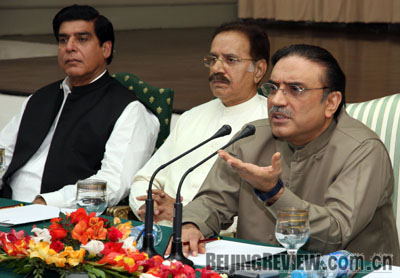|

ZARDARI AS CANDIDATE: Asif Ali Zardari (right), co-chairman of the ruling Pakistan
People's Party (PPP), addresses the Central Executive Committee
meeting in Islamabad on August 22.The PPP
announced Zardari's candidacy that day for the presidential
election to be held on September 6
Pakistan's military leaders took a neutral position, further weakening Musharraf. General Ashfaq Parvez Kayani, who became Chief of Army Staff in November 2007 when Musharraf gave up the title, hopes to keep the military removed from politics. He has prohibited soldiers from meeting with politicians and ordered all active officers to resign from civilian government positions. The new policies indicate Kayani's stance: Unless it is unavoidable, Pakistan's army will not intervene in politics. The military's attitude was pivotal in determining the outcome of the recent political crisis. Without military support, Musharraf's political foundation was shaky at best.
The Pakistani people were unenthusiastic about Musharraf's cooperation with Washington in the war on terror. Musharraf relied on the U.S. aid and support to maintain political power, but he also faced a dilemma. The United States required him to sweep the Pakistan-Afghanistan border region, root out the Taliban and Al Qaeda fighters entrenched there, and assist in the search for Osama bin Laden. However, the border region includes Pashtun tribal areas controlled by religious parties, beyond the central government's authority. If Musharraf launched military attacks, not only Pashtun tribe leaders and soldiers would resist, but also major religious parties would be enraged. If Musharraf performed his antiterror duties in a perfunctory manner, Washington would discard him and find another partner.
While the United States accused Pakistan of being unable or unwilling to strike the Taliban and Al Qaeda, the Pakistani people became angrier at the United States. The U.S.-led war on terror has cost Pakistan's military about 1,000 lives. In June 2008, tensions increased when a U.S. air strike targeting militants killed 11 Pakistani infantrymen instead. Moreover, some people in Pakistan, as in other Muslim countries, are displeased with U.S. diplomatic policy and consider the war on terror a war against Islam. Musharraf thus was condemned as a mouthpiece for the United States. The Pakistani people projected their dissatisfaction with the United States onto Musharraf, making him the scapegoat.
Recently, anti-American sentiment in Pakistan has become seemingly overwhelming. People believe that the country is involved in a war it can never win. Some Pakistanis blame Musharraf's support for the U.S. effort for the growing violence inside the country. As Musharraf lost his people's hearts, he also lost his political foundation.
Musharraf was losing American support as well. When Musharraf pledged his support for the war on terror after the September 11 attacks on the United States in 2001, Washington heaped praise and rewards. The United States not only lifted sanctions it had imposed on Pakistan, but also provided more than $10 billion in aid. At the same time, however, some Americans feared their cooperation with Musharraf was weakening democratic forces in the South Asian country. They pointed out that, as Pakistan is a politically volatile country with a population of 165 million, the United States should not rely purely on government or military officials. They believed that the United States should assist Pakistan's democratic forces instead. The U.S. Government was not satisfied with Musharraf's antiterror efforts, either, with some officials questioning whether they were worth the price tag in aid.
As Musharraf relinquished his military position and saw his opponents elected to parliament, the Bush administration distanced itself from him. When Musharraf was under heavy pressure to resign, his American allies did not offer him a helping hand as usual. In an August 18 statement on Musharraf's resignation, U.S. Secretary of State Condoleezza Rice expressed support for the democratically elected government. "We believe that respect for the democratic and constitutional processes in that country is fundamental to Pakistan's future and its fight against terrorism," she said.
Challenges ahead
Although Musharraf has resigned, political acrimony remains. The PPP and the PML-N already clash on a number of issues. Now they begin a new dispute over power distribution, which could be a destabilizing issue. Moreover, the ruling alliance has few political achievements to show for the past four months, and its approval rating has hit rock bottom. Lawmakers will almost certainly redistribute decision-making powers and weaken the presidency. Now the focus is on who will fill the position. Zardari is favored to win the September 6 election, while the PML-N has put forward Saeed-uz-Zaman Siddiqui, a former judge.
The new Pakistan Government will face a series of problems, primarily combating terrorism and developing the domestic economy. Just one day after Musharraf resigned, a suicide bomb at a hospital in northwest Pakistan killed 26 people. On the same day, five Pakistani soldiers and 14 Taliban members died in a clash between security forces and militants in the border region. Militant group Tehrik-e-Taliban Pakistan claimed responsibility for the hospital attack, warning that it would launch more attacks in other Pakistani cities. Pakistan's economic situation also continues to deteriorate, with rising inflation and increasing shortages in food and electric power.
The author is deputy director of the Department for Information and Contingencies Analysis at the China Institute of International Studies |
